Delhi High Court: In a case wherein an appeal was filed challenging the order dated 14-12-2021, whereby a writ petition filed by three teachers seeking payment of 7th Central Pay Commission was allowed, the Division Bench of Manmohan* and Mini Pushkarna, JJ., had set aside the appeal and held that the teachers of unaided private schools were entitled to same pay and emoluments as those of government schools.
Background
In the present case, three teachers (Respondents 1 to 3) were working in Bharat Mata Saraswati Bal Mandir Senior Secondary School (appellant) on a regular basis. Pursuant to recommendations of the 7th Central Pay Commission, Respondent 5, Directorate of Education (‘DOE’) issued notification dated 17-10-2017, whereby all the private recognized schools were asked to implement the same. Since the benefit of the 7th Central Pay Commission was not extended by the appellant, the Respondents 1 to 3 approached this Court by filing a writ petition.
On 14-12-2021, the Single Judge directed the appellant to grant benefits/salaries to the teachers, in terms of provisions of the 7th Central Pay Commission and held that Respondents 1 to 3 were entitled to arrears with effect from January 2016. Thus, the present appeal had been filed by the school.
Contentions of the Appellant
The appellant contented that it was not amenable to writ jurisdiction as it was an unaided private school and even if the writ petition was held to be maintainable, no direction for payment of arrears could have been passed as the claim for recovery of arrears beyond the period of three years was barred by law of limitation.
Analysis, Law, and Decision
The Court opined that the writ petition filed by Respondents 1 to 3 was maintainable as it involved a public law element inasmuch as, the Respondents 1 to 3 were seeking the implementation of Section 10(1) of the Delhi School Education Act, 1973 (‘DSE Act, 1973’), which provided that “the scales of pay and allowances, medical facilities, pension, gratuity, provident fund and other benefits of the employees of a recognised private school employees shall not be less than those of the employees of the corresponding status in schools run by the appropriate Authority”.
The Court relied on St. Mary’s Education Society v. Rajendra Prasad Bhargava, (2023) 4 SCC 498, wherein the Supreme Court held that “an application under Article 226 of the Constitution was maintainable against a person or a body discharging public duties or public functions. The public duty cast might be either statutory or otherwise and where it was, otherwise, the body or the person must be shown to owe that duty or obligation to the public involving the public law element. Similarly, for ascertaining the discharge of public function, it must be established that the body or the person was seeking to achieve the same for the collective benefit of the public or a section of it and the authority to do so must be accepted by the public”. Thus, the Court opined that the writ petition filed by Respondents 1 to 3 was maintainable.
The Court further observed that the writ petition filed by Respondents 1 to 3 was not barred by delay and laches, as the cause of action was a recurring one. The Court relied on Union of India v. Tarsem Singh, (2008) 8 SCC 648, wherein the Supreme Court had clarified that if the issue was related to payment of pay, relief should be granted in spite of delay as it did not affect third party rights.
The Court reiterated that the reliefs claimed by Respondents 1 to 3 in the writ petition were for payment of full salary as per recommendations of 7th Central pay Commission. The Court noted that Section 10 of the DSE Act provided that the scale of pay and allowances, medical facilities, pension, gratuity, provident fund, and other prescribed benefits of a recognized private school shall not be less than those of the employees of the corresponding status in the government School. The Court noted that the DOE in accordance with the DSE Act, 1973 had issued notification dated 17-10-2017 directing that all recognized schools shall implement the recommendations of 7th Central pay Commission.
Thus, the Court held that the teachers of unaided private schools a were entitled to the same pay and emoluments as those of government schools in terms of the obligation enjoined upon the private recognized schools under the DSE Act, 1973. The Court further held that the schools could not evade their statutory responsibility and were bound to pay statutory dues. Consequently, the Court dismissed the present appeal as it was bereft of merit.
[Bharat Mata Saraswati Bal Mandir Senior Secondary School v. Vinita Singh, 2023 SCC OnLine Del 3934, decided on 7-7-2023]
*Judgement pronounced by- Justice Manmohan
Advocates who appeared in this case:
For the Appellant – Parvinder Chauhan, Aakriti Garg, Advocates;
For the Respondents – Yeeshu Jain, Standing Counsel; Jyoti Tyagi and Manisha, Advocates.

